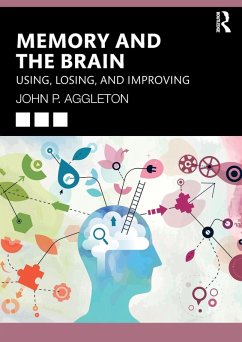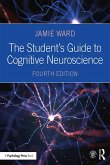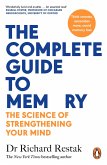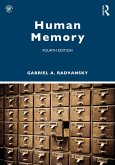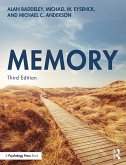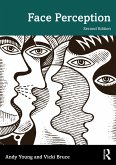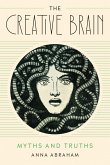- Broschiertes Buch
- Merkliste
- Auf die Merkliste
- Bewerten Bewerten
- Teilen
- Produkt teilen
- Produkterinnerung
- Produkterinnerung
Memory and the Brain explores the fascinating psychology and neuroscience of human memory. Written by a World expert in the field, John P. Aggleton, this book covers learning and memory from the very beginning of life to its end, with an emphasis on real-world applications throughout.
Andere Kunden interessierten sich auch für
![The Student's Guide to Cognitive Neuroscience The Student's Guide to Cognitive Neuroscience]() Jamie WardThe Student's Guide to Cognitive Neuroscience49,99 €
Jamie WardThe Student's Guide to Cognitive Neuroscience49,99 €![The Complete Guide to Memory The Complete Guide to Memory]() Richard RestakThe Complete Guide to Memory15,99 €
Richard RestakThe Complete Guide to Memory15,99 €![Human Memory Human Memory]() Gabriel A. RadvanskyHuman Memory127,99 €
Gabriel A. RadvanskyHuman Memory127,99 €![Memory Memory]() Alan Baddeley (UK The University of York)Memory76,99 €
Alan Baddeley (UK The University of York)Memory76,99 €![Face Perception Face Perception]() Andy Young (UK York University)Face Perception160,99 €
Andy Young (UK York University)Face Perception160,99 €![Face Perception Face Perception]() Andy Young (UK York University)Face Perception66,99 €
Andy Young (UK York University)Face Perception66,99 €![The Creative Brain The Creative Brain]() Anna AbrahamThe Creative Brain31,99 €
Anna AbrahamThe Creative Brain31,99 €-
-
-
Memory and the Brain explores the fascinating psychology and neuroscience of human memory. Written by a World expert in the field, John P. Aggleton, this book covers learning and memory from the very beginning of life to its end, with an emphasis on real-world applications throughout.
Hinweis: Dieser Artikel kann nur an eine deutsche Lieferadresse ausgeliefert werden.
Hinweis: Dieser Artikel kann nur an eine deutsche Lieferadresse ausgeliefert werden.
Produktdetails
- Produktdetails
- Verlag: Taylor & Francis Ltd
- Seitenzahl: 268
- Erscheinungstermin: 16. Dezember 2024
- Englisch
- Abmessung: 246mm x 174mm x 15mm
- Gewicht: 556g
- ISBN-13: 9781032826592
- ISBN-10: 1032826592
- Artikelnr.: 71234446
- Herstellerkennzeichnung
- Libri GmbH
- Europaallee 1
- 36244 Bad Hersfeld
- gpsr@libri.de
- Verlag: Taylor & Francis Ltd
- Seitenzahl: 268
- Erscheinungstermin: 16. Dezember 2024
- Englisch
- Abmessung: 246mm x 174mm x 15mm
- Gewicht: 556g
- ISBN-13: 9781032826592
- ISBN-10: 1032826592
- Artikelnr.: 71234446
- Herstellerkennzeichnung
- Libri GmbH
- Europaallee 1
- 36244 Bad Hersfeld
- gpsr@libri.de
John P. Aggleton is an Emeritus Professor of Psychology at Cardiff University, Wales. In recent years he was President of the British Neuroscience Association and in 2012 he was made a Fellow of the Royal Society in recognition of his discoveries concerning the brain and memory.
1. Memories make us who we are. 2. From before birth to adolescence. 3.
Adulthood, aging, and superaging. 4. How accurate and durable are our adult
memories?. 5. Comprehension, encoding, and recall. 6. Why do we forget?.
7.Context and memory. 8. Superior memory in individuals: Mnemonists, memory
champions, and savants. 9. Superior memory for all: Mnemonics, imagery, and
skilled performance. 10. 'Smart drugs', supplements, and self-brain
stimulation. 11. The value of sleep. 12. Imagination, future memory, and
prospective memory. 13. Recognition memory and illusions of familiarity.
14. Brief memory stores: Sensory memory. 15. Brief memory stores:
Short-term memory. 16. Brief memory stores: Working memory. 17. Losing
memory: Real amnesias and simulated amnesias. 18. Losing memory:
Alzheimer's disease and other dementias. 19. An alphabet of memory
curiosities. A)Aphantasia: People who lack imagery. B)Bilingualism - does
it aid memory?. C)Computerised brain training - does it work?.
D)Duplicates, delusions, and familiarity disorders. E)Exercise - is it
worth it?. F)Food preferences and learnt taste aversions. G)The 'Generation
Effect', the Aha! moment, and memory. H)Hypnosis, memory, and the law.
I)Illusions of learning and illuminating text. J)Jennifer Aniston neurons.
K)Knowing your own memory - metamemory and metacognition. L)L learners:
Spaced versus massed practice. M)Mozart, music, and memory. N)Neuromyths in
education - eight seductive ideas. O)Openness and the three Rs
(Reproducibility, Robustness, and Replicability). P)Parrot learning -
learning by rote. Q)Quite interesting and quite curious. R)Return trip
effect. S) Surprise and memory. T) Truth serums. U) Unconscious learning -
can you learn when anaesthetised?. V) Vegetative brain state, awareness,
and new learning. W) White matter learning. XX XY) Sex differences and
memory. Y) Y is money called money? The worship of memory. Z) Being at the
end of the alphabet - good or bad? (not to forget zebrafish). 20. Naming
the Brain. 21. Twenty (plus one) ways to improve your memory. References.
Adulthood, aging, and superaging. 4. How accurate and durable are our adult
memories?. 5. Comprehension, encoding, and recall. 6. Why do we forget?.
7.Context and memory. 8. Superior memory in individuals: Mnemonists, memory
champions, and savants. 9. Superior memory for all: Mnemonics, imagery, and
skilled performance. 10. 'Smart drugs', supplements, and self-brain
stimulation. 11. The value of sleep. 12. Imagination, future memory, and
prospective memory. 13. Recognition memory and illusions of familiarity.
14. Brief memory stores: Sensory memory. 15. Brief memory stores:
Short-term memory. 16. Brief memory stores: Working memory. 17. Losing
memory: Real amnesias and simulated amnesias. 18. Losing memory:
Alzheimer's disease and other dementias. 19. An alphabet of memory
curiosities. A)Aphantasia: People who lack imagery. B)Bilingualism - does
it aid memory?. C)Computerised brain training - does it work?.
D)Duplicates, delusions, and familiarity disorders. E)Exercise - is it
worth it?. F)Food preferences and learnt taste aversions. G)The 'Generation
Effect', the Aha! moment, and memory. H)Hypnosis, memory, and the law.
I)Illusions of learning and illuminating text. J)Jennifer Aniston neurons.
K)Knowing your own memory - metamemory and metacognition. L)L learners:
Spaced versus massed practice. M)Mozart, music, and memory. N)Neuromyths in
education - eight seductive ideas. O)Openness and the three Rs
(Reproducibility, Robustness, and Replicability). P)Parrot learning -
learning by rote. Q)Quite interesting and quite curious. R)Return trip
effect. S) Surprise and memory. T) Truth serums. U) Unconscious learning -
can you learn when anaesthetised?. V) Vegetative brain state, awareness,
and new learning. W) White matter learning. XX XY) Sex differences and
memory. Y) Y is money called money? The worship of memory. Z) Being at the
end of the alphabet - good or bad? (not to forget zebrafish). 20. Naming
the Brain. 21. Twenty (plus one) ways to improve your memory. References.
1. Memories make us who we are. 2. From before birth to adolescence. 3.
Adulthood, aging, and superaging. 4. How accurate and durable are our adult
memories?. 5. Comprehension, encoding, and recall. 6. Why do we forget?.
7.Context and memory. 8. Superior memory in individuals: Mnemonists, memory
champions, and savants. 9. Superior memory for all: Mnemonics, imagery, and
skilled performance. 10. 'Smart drugs', supplements, and self-brain
stimulation. 11. The value of sleep. 12. Imagination, future memory, and
prospective memory. 13. Recognition memory and illusions of familiarity.
14. Brief memory stores: Sensory memory. 15. Brief memory stores:
Short-term memory. 16. Brief memory stores: Working memory. 17. Losing
memory: Real amnesias and simulated amnesias. 18. Losing memory:
Alzheimer's disease and other dementias. 19. An alphabet of memory
curiosities. A)Aphantasia: People who lack imagery. B)Bilingualism - does
it aid memory?. C)Computerised brain training - does it work?.
D)Duplicates, delusions, and familiarity disorders. E)Exercise - is it
worth it?. F)Food preferences and learnt taste aversions. G)The 'Generation
Effect', the Aha! moment, and memory. H)Hypnosis, memory, and the law.
I)Illusions of learning and illuminating text. J)Jennifer Aniston neurons.
K)Knowing your own memory - metamemory and metacognition. L)L learners:
Spaced versus massed practice. M)Mozart, music, and memory. N)Neuromyths in
education - eight seductive ideas. O)Openness and the three Rs
(Reproducibility, Robustness, and Replicability). P)Parrot learning -
learning by rote. Q)Quite interesting and quite curious. R)Return trip
effect. S) Surprise and memory. T) Truth serums. U) Unconscious learning -
can you learn when anaesthetised?. V) Vegetative brain state, awareness,
and new learning. W) White matter learning. XX XY) Sex differences and
memory. Y) Y is money called money? The worship of memory. Z) Being at the
end of the alphabet - good or bad? (not to forget zebrafish). 20. Naming
the Brain. 21. Twenty (plus one) ways to improve your memory. References.
Adulthood, aging, and superaging. 4. How accurate and durable are our adult
memories?. 5. Comprehension, encoding, and recall. 6. Why do we forget?.
7.Context and memory. 8. Superior memory in individuals: Mnemonists, memory
champions, and savants. 9. Superior memory for all: Mnemonics, imagery, and
skilled performance. 10. 'Smart drugs', supplements, and self-brain
stimulation. 11. The value of sleep. 12. Imagination, future memory, and
prospective memory. 13. Recognition memory and illusions of familiarity.
14. Brief memory stores: Sensory memory. 15. Brief memory stores:
Short-term memory. 16. Brief memory stores: Working memory. 17. Losing
memory: Real amnesias and simulated amnesias. 18. Losing memory:
Alzheimer's disease and other dementias. 19. An alphabet of memory
curiosities. A)Aphantasia: People who lack imagery. B)Bilingualism - does
it aid memory?. C)Computerised brain training - does it work?.
D)Duplicates, delusions, and familiarity disorders. E)Exercise - is it
worth it?. F)Food preferences and learnt taste aversions. G)The 'Generation
Effect', the Aha! moment, and memory. H)Hypnosis, memory, and the law.
I)Illusions of learning and illuminating text. J)Jennifer Aniston neurons.
K)Knowing your own memory - metamemory and metacognition. L)L learners:
Spaced versus massed practice. M)Mozart, music, and memory. N)Neuromyths in
education - eight seductive ideas. O)Openness and the three Rs
(Reproducibility, Robustness, and Replicability). P)Parrot learning -
learning by rote. Q)Quite interesting and quite curious. R)Return trip
effect. S) Surprise and memory. T) Truth serums. U) Unconscious learning -
can you learn when anaesthetised?. V) Vegetative brain state, awareness,
and new learning. W) White matter learning. XX XY) Sex differences and
memory. Y) Y is money called money? The worship of memory. Z) Being at the
end of the alphabet - good or bad? (not to forget zebrafish). 20. Naming
the Brain. 21. Twenty (plus one) ways to improve your memory. References.

